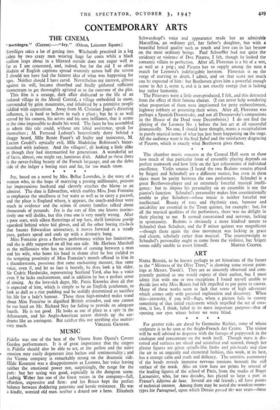CONTEMPORARY ARTS
THE CINEMA
" Sortileges." (Curzon)—" Ivy." (Odeon, Leicester Square.) Sortileges takes a lot of getting into. Witchcraft practised in a log cabin by two crazy men wearing huge fur coats while a black stallion leaps about in a blizzard outside does not augur well as far as I am concerned, and, indeed, but for the aid I so often disdain of English captions spread wantonly across half the screen I should not have had the faintest idea of what was happening for ages. Neither should I have cared. Nevertheless my interest, almost against its will, became absorbed and finally gathered sufficient momentum to get thoroughly agitated as to the outcome of the plot.
This film is a strange, dark affair dedicated to the life of an isolated village in the Massif Central, a village embedded in snow, surrounded by grim mountains, and inhabited by a primitive people riddled with superstition. Away from M. Christian Jaque's directing influence, it is hard to believe in such a place ; but he is so well served by his camera, his actors and his own brilliance, that it seems at the time impossible to doubt his word. The faces he has assembled to adorn this tale could, without any labial assistance, speak for themselves ; M. Fernand Ledoux's benevolently dotty behind a shaggy beard, Mlle Renee Faures all frailty and innocence, M. Lucien Coeders optically evil, Mlle Madeleine Robinson's bitter- mouthed with jealousy. And the villagers', all looking a little alike as though they had intermarried for generations. A wonderful set of faces, almost, one might say, luminous dials. Added to these there is the never-failing beauty of the French language, and on the debit side of the ledger a boring start and far, far too much snow.
* * * *
Ivy, based on a novel by Mrs. Belloc Lowndes, is the story of a woman who, in the hope of marrying a passing millionaire, poisons her impecunious husband and cleverly attaches the blame to an admirer. The date is Edwardian, which enables Miss Joan Fontaine to emphasise the smallness of her waist as well as to carry a parasol, and the place is England where, it appears, the coach-and-four were much in evidence and the scions of county families talked about theousands of peounds. Ivy is the sort of film one knows instinc- tively one will dislike, but this time one is very nearly wrong. After a poor start, with silken flutterings of top hats, shrill feminine gossip squeaked behind white kid gloves, and all the other boring tra-la-la that haunts Edwardian aristocracy, it moves forward at a steady pace, gathers speed and ends up with a dramatic bang.
Miss Fontaine gives a flawless performance within her limitations, and she is ably supported on all but one side. Mr. Herbert Marshall as the millionaire who has no intention of coming between a man and his wife, who bows his head in shame after he has yielded to the tempting proximity of Miss Fontaine's mouth offered to him in a thunderstorm, possesses that same enchanting manner, that same voice, even if, and let us face it bravely, he does look a bit older. Sir Cedric Hardwicke, representing Scotland Yard, also has a voice even if he lacks enchantment, and in addition he has a perfect sense of timing. As the love-sick dupe, Mr. Patric Knowles does all that is expected of him, which is simply to be an English gentleman, to look as dull as a rice pudding and be stolidly determined to sacrifice his life for a lady's honour. These three high-minded males stand about Miss Fontaine in dignified British attitudes, and one cannot be too hard on Mr. Richard Ney for failing to provide an adequate fourth. He is not good. He looks as out of place as a spiv in the Athanaeum, and his Anglo-American accent shrivels up the ear- drums like an astringent. But neither this nor anything else matters


































 Previous page
Previous page